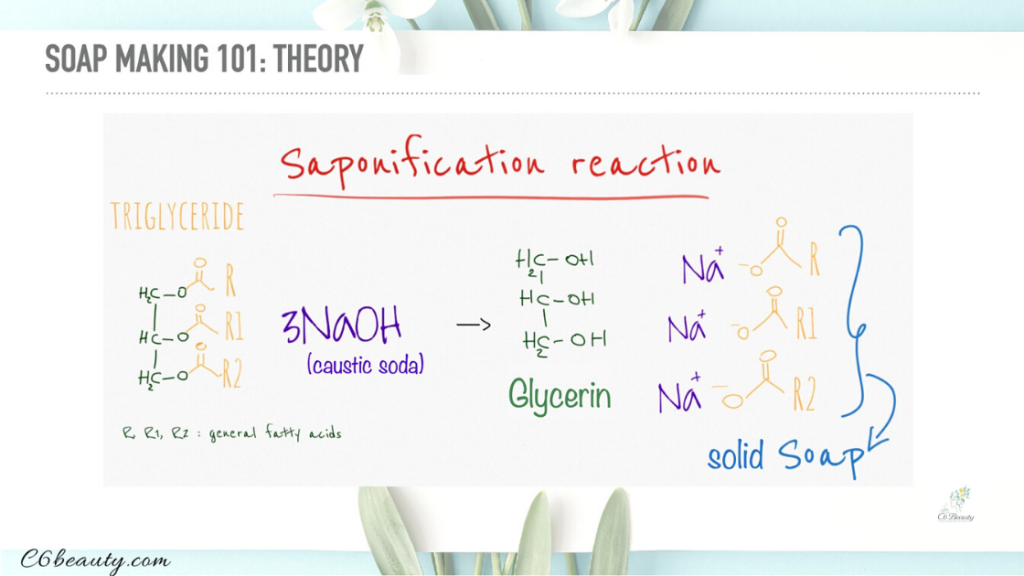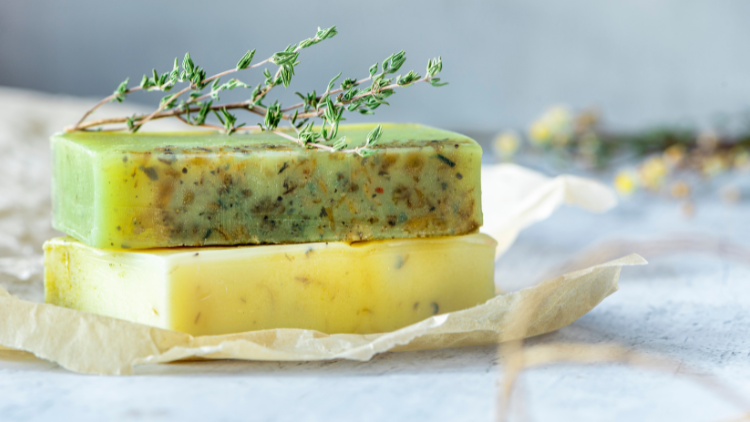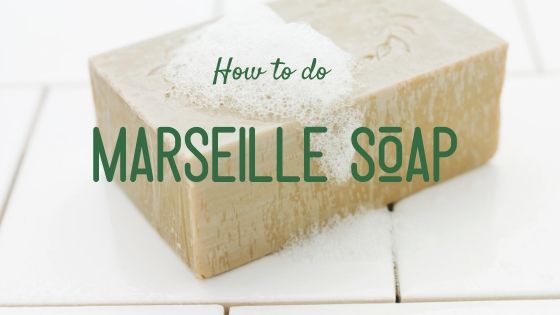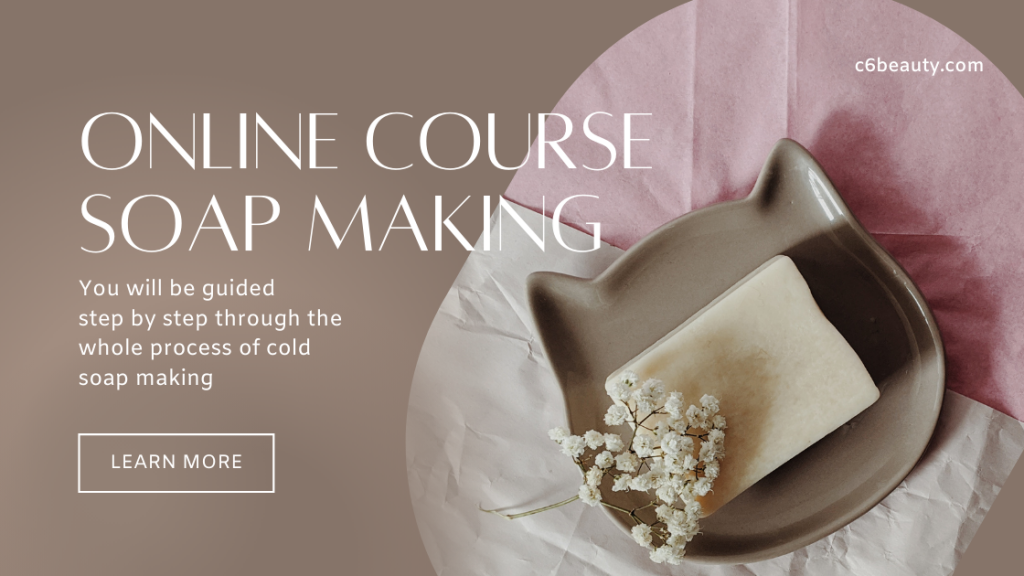Making soap at home is something satisfying. You can play with oils and colors and get your own soap according to each need. If you want to learn more about the chemistry behind making soap, click here! I have created a course with all the information to help you make your own homemade soaps from scratch! But back to homemade Marseille soap and how to make it. The traditional recipe for Marseille soap involves additional cooking at 100 or 110 degrees (about 220 Fahrenheit) and several washes with salt water. I will avoid these steps because living in a small apartment it would be difficult to have a dedicated space, so I will repurpose the recipe with the cold process (as for making Castile soap).
Learn everything about soap making with my comprehensive course! Everything from ingredients, to lye discount, superfat, and much more!
Disclosure: Some of the links in this post are affiliate links. By clicking through them and making a purchase, I may receive a small commission WITHOUT any additional cost to you.
Gabi
Marseille soap | Recipe
Marseille soap is a bar made from olive oil. It was produced for the first time around 1300 and continues to be used nowadays. It has always been known as a multi-purpose soap suitable for hand washing, housekeeping, perfume closets, and so on. For this reason, today I want to tell you briefly how to make your own soap at home 🙂

Marseille soap using the cold process method
Contrary to glycerine soap, preparing soap in a traditional way requires attention and awareness of what you are going to handle.

Soap is the result of a chemical reaction between fats and lye.
With the use of caustic soda, it is important to always wear protective gloves and goggles. Wear long-sleeved clothing and also a mask to avoid breathing in the caustic vapors given off during the preparation of the aqueous soda ash solution. I recommend, therefore, always working with the windows open to have a well-ventilated environment!
Even more important: SOAP PREPARATION IS NOT AN ACTIVITY SUITABLE FOR CHILDREN. Never make soap with the cold method if there are children nearby!!! Read my post on “what they don’t tell you about soap making,” here you will find useful information on how to approach the world of soaps safely.
Marseille soap ingredients
To make soap using the cold method, it is important to have tools and some equipment. I’ve written a list that might be useful to you. You can find it by clicking here.
- 250g (8.8oz) olive oil (find it here)
- 65g (2.3oz) distilled water (find it here)
- 32g (1.1oz) caustic soda (find it here)
Marseille soap | Tools
- protective gloves (find it here)
- safety goggles (find it here)
- silicon molds (find it here)
- protective mask (find it here)
- Pyrex cups (find them here) or in PP (find it here)
- Silicone spatula (find it here)
- hand blender (find it here)

How to make Marseille soap
First, protect yourself with gloves and goggles and open windows to keep the room well ventilated. We use caustic soda which is extremely corrosive, so be EXTREMELY careful. Should it come in contact with your skin, quickly wipe off excess soda with running water and call a doctor IMMEDIATELY!!!
To avoid accidents, I recommend that you check out my MINI COURSE devoted entirely to this aspect. In my MINI COURSE, you will find key recommendations and tips to help you handle soda properly. Also, a simple tutorial to show you how to make a simple bar of soap with just a few ingredients. Have a look here!

Procedure
- Weigh the water in a glass (I make a mix of water and ice to control the temperature. All the details and quantities in my Mini COURSE)
- Pour the olive oil in a jar, big enough to contain about 300g (10.6oz) of the finished product.
- Weigh the lye in another glass
- Pour gently lye into the water and mix with a wooden or glass rod. I would not use a plastic or metal spoon to avoid potential reactions with the lye. REMEMBER: DO NOT pour water into the bowl of lye! The reaction would be so violent that it would seriously hurt you! The solution will get hot at about 90°C (194°F) leave it cool down till about 45°C (113°F).
- Warm up the oil in a water bath or microwave until about 45°C (113°F). Oil and lye solution should have the same temperature.
- Pour the lye solution into the oil jar and mix the two phases with a mixer.

When the compound gets thicker and opaque, it’s ready to be poured into a plastic mold.
It will take several days for the soap to become solid, but it will be worth the wait. Normally, I prefer to leave the soap undisturbed and covered with a cloth for several months. This will ensure the saponification reaction to be totally exhausted.
Marseille soap | Curing Time
But why let our soaps sit for so long? Is it really necessary?
Curing is a process that is highly influenced by the composition of the soap and the conditions under which this stage takes place. For these reasons, it is difficult to define an exact curing time that is good for each soap. In this case, having used only olive oil, which is composed of a high percentage of unsaturated triglycerides, it will be necessary to let the soap rest longer. We should not be surprised if the curing time could be much longer for this soap even up to a year. If you want to learn more about curing, check out my article dedicated exclusively to this stage of the process. You can find it here!
Marseille soap | Considerations
Although this soap uses lye as the main ingredient, I find this soap mild and effective. I mainly use it to wash my hands and clothes. It has a good cleaning action although it does not make many bubbles 🙂
Learn everything about soap making with my comprehensive course! Everything from ingredients, to lye discount, superfat, and much more!

Ready to make your first soap with my FREE guide to making soap?

If you like my content, help me with a small donation. With your support, I would like to buy new ingredients and create original healthy beauty products! Thank you :).
Gabi



Pinned! I have to try this. Thank you for sharing.
Thanks! It’s my favorite soap! 🙂
Actually that is Castile soap, not marseille..But a very nice soap nevetheless
Hi Nair! Thank you so much for your comment. I think my confusion is due to the fact that in my family, my grandmother used to call the soap she made with olive oil as Marseille soap. Thanks to your comment I went deeper into the subject and learned something new. 🙂 Thank you! I will update the post! 🙂